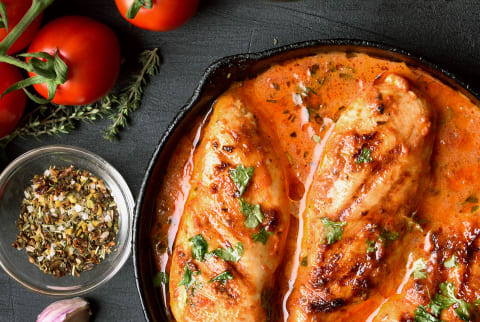Advertisement
5 Anti-Inflammatory Ingredients Nutrition Experts Add To Their Meals



Here at mbg, we're all about small tweaks that can make a big difference in your health. With that in mind, we asked some of the country's best functional doctors and nutrition experts the single ingredients they add to their dinner to maximize the meal's anti-inflammatory effects. The answer? They rely heavily on herbs and spices (both dried and fresh) and lean into all things green. Here's what their meals look like, so you can up-level your own:
Herbs
I use a lot of herbs in my cooking, fresh in season, dried when not. Oregano, thyme, basil, cilantro—the list goes on. Not only do herbs make everything taste more flavorful and vibrant, but they have numerous health benefits1 from supporting healthy weight to their anti-inflammatory, antioxidant effects. Start with a few seasonings from your favorite cuisine: If you love Italian, emphasize basil and oregano; if Asian is your favorite, try ginger and garlic; if you love Mexican, try oregano, chilies, cilantro, and cumin. For fresh herbs all year round, try growing chives, oregano, thyme, and cilantro as houseplants in a sunny windowsill!
Garlic
Dinner is not dinner in my home if there is no garlic. Not only do I love the way it smells when it starts cooking, but I also love the way it adds such a powerful flavor to everything. The bonus is that it has so many health benefits, including fighting inflammation. If I'm actually following a recipe (which is rare!), I'll always double the amount of garlic it calls for. As I think about it, I must always end up with garlic breath, but it is so worth it, and luckily my husband doesn't mind!
—Allison (Aaron) Gross, M.S., RDN, CDN, founder of Nutrition Curator
I try to incorporate garlic into almost every single meal since it is one of the most versatile ingredients. No matter what type of dish I am cooking, whether it is a simple grass-fed burger or an Asian-inspired stir-fry, garlic is the perfect addition that will complement the flavors that are already present in the dish. Garlic contains sulfur, which plays a role in inhibiting pro-inflammatory cytokines like NF-kb and increasing glutathione, a powerful antioxidant that also helps drive down inflammation in the body. This is something I talk about at length in my new book, The Inflammation Spectrum.
—Will Cole, D.C., mbg Collective member and author of The Inflammation Spectrum
Oregano
I love to add oregano to vegetables, fish, chicken—basically whatever I'm making. Oregano contains thymol and carvacrol, plant-based compounds that fight inflammation and help boost immunity2. Plus, they make everything taste good!
—Isabel Smith, R.D., founder of Isabel Smith Nutrition
Green veggies
I always incorporate a green veggie at dinner. Partly because my momma always had a green veg on the dinner table, usually green beans, which is probably why I avoid green beans as an adult. But you can always find something green on my plate. Asparagus, arugula, and broccoli (or broccolini if I'm feelin' fancy) are my top three faves! They offer so many fabulous health benefits, including fiber (keeps me regular, which is very important), folate (aka vitamin B9), and vitamin K. In fact, this study3 showed that one serving (just ONE serving!) of green veggies slowed the process of cognitive decline with age. Boom. Need I say more? Green veggies for the win.
—Tori Eaton, R.D., founder of Honestly Tori
Garlic powder, onion powder, and turmeric
When I cook, I try to select foods and ingredients with intention based on their benefits. I often roast seasonal vegetables for a dinner side dish, and my favorite trifecta of spices I incorporate are garlic powder, onion powder, and turmeric. Not only does this add something different, but multiple studies4 have shown that curcumin, the ingredient that contributes to turmeric's color and flavor, is a potent anti-inflammatory and antimicrobial agent. If I can eat delicious, real food while fighting disease at the same time, that is a win!
—Sara McGlothlin, holistic nutritionist, founder of SaraMcGlothlin.com

Why Nutrition Is Key To Changing Your Relationship With Alcohol
Brooke Scheller, DCN, CNS

Why Alcohol Sabotages Your Gut Health & How To Get Back On Track
Brooke Scheller, DCN, CNS

Why Nutrition Is Key To Changing Your Relationship With Alcohol
Brooke Scheller, DCN, CNS

Why Alcohol Sabotages Your Gut Health & How To Get Back On Track
Brooke Scheller, DCN, CNS

Why Nutrition Is Key To Changing Your Relationship With Alcohol
Brooke Scheller, DCN, CNS

Why Alcohol Sabotages Your Gut Health & How To Get Back On Track
Brooke Scheller, DCN, CNS

Why Nutrition Is Key To Changing Your Relationship With Alcohol
Brooke Scheller, DCN, CNS

Why Alcohol Sabotages Your Gut Health & How To Get Back On Track
Brooke Scheller, DCN, CNS














